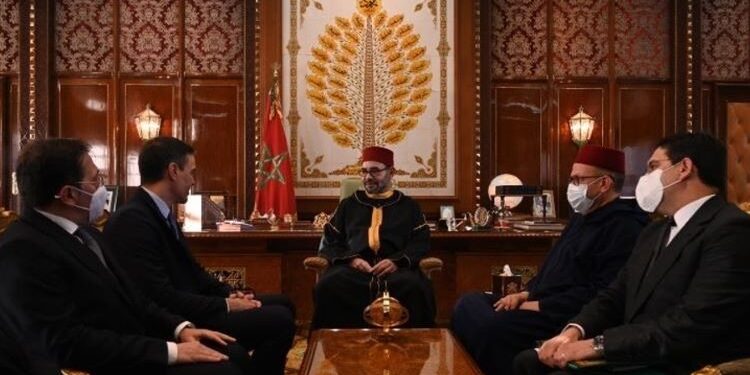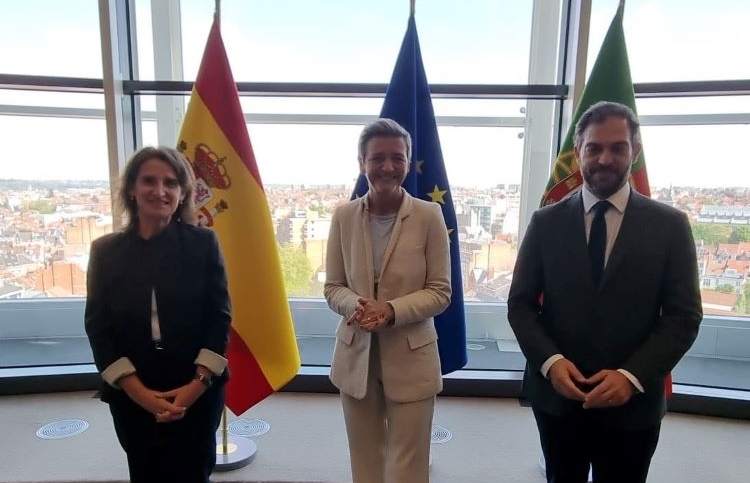The Diplomat
The Minister of Foreign Affairs, José Manuel Albares, announced yesterday that the Spanish-Moroccan commission in charge of dealing with the delimitation of territorial waters will meet again “shortly” after fifteen years without doing so. He also dodged the latest diplomatic clashes with Algeria and insisted that it is “a solid and reliable partner with which Spain wants to have the best relations”.
During a joint press conference with the Latvian Foreign Minister, Edgars Rinkēvičs, Albares announced yesterday at the Palacio de Viana in Madrid that the working group on delimitation of maritime spaces on the Atlantic coast, “which has not met for 15 years”, will meet “shortly”. The reactivation of the “working group on the delimitation of maritime areas on the Atlantic coast, with the aim of achieving concrete progress”, is included in the joint Spanish-Moroccan declaration approved last April 7 in Rabat during the official trip of the President of the Government, Pedro Sanchez, in which Albares also participated and in which both were received by King Mohamed VI.
Shortly before the press conference, the president of the Canary Islands, Ángel Víctor Torres, announced before the regional Parliament that the first meeting of this commission will take place next week, and Albares himself also assured yesterday before the plenary session of the Senate that the archipelago will have a representative in the commission, “as it cannot be otherwise” and as it also happened in 2005. “We are going to do everything possible so that (the maritime space) is delimited through an agreement between both States, between Spain and Morocco, within the United Nations Convention on the Law of the Sea”, and so that, “once and for all”, that maritime space is “a joint space between Spain and Morocco, between the Canary Islands and Morocco, and not a space of confrontation”, he said before the Upper House.
In December 2019, the Moroccan Parliament unanimously approved two laws to delimit for the first time its maritime space with Spain and Mauritania. The issue was again activated a few days ago after Rabat announced the discovery of oil in two wells near the Canary Islands, just a month after the two countries normalized their bilateral relations following the Spanish decision to accept the autonomy plan for Western Sahara.
Algeria
This decision, on the other hand, has seriously deteriorated relations between Spain and its main gas supplier, Algeria. Last Saturday, Algerian President Abdelmayid Tebboune described as “ethically and historically unacceptable” Spain’s turnaround on Western Sahara and accused Pedro Sanchez of having broken the “cordial and strong” relations between the two countries. However, he guaranteed that Algeria will absolutely comply with all gas supply agreements with Spain.
In response to these statements, Albares assured Onda Cero on Monday that he had no intention of “feeding sterile controversies” and that Spain had taken “a sovereign decision within international legality”. These words did not go down well in Algeria, which hours later said – through the special envoy for Western Sahara and the Maghreb at the Ministry of Foreign Affairs, Ammar Belani – that the minister’s statements “in response to the declarations of the President of the Republic” were “regrettable and totally unacceptable” and “will certainly not contribute to a rapid return to normality in bilateral relations”. Asked at yesterday’s press conference about this new incident, Albares merely reiterated that “Algeria is a solid and reliable partner with which Spain wants to have the best relations.” “I have said it many times, but I repeat it again,” he insisted.







